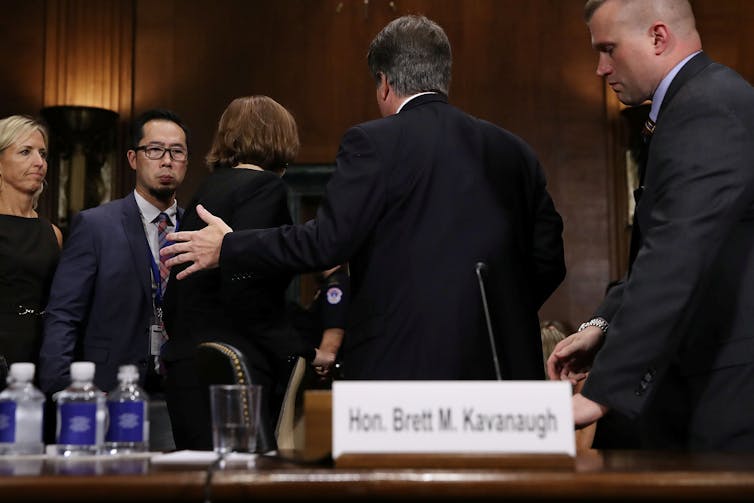Does a man's social class have anything to do with the likelihood he'll commit sexual assault?
- Written by Jamie L. Small, Assistant Professor, University of Dayton
Defending his reputation against Dr. Christine Blasey Ford’s allegations of sexual assault, Judge Brett Kavanaugh worked hard, and angrily, to present himself as a respectable man in his statement to the Senate Judiciary Committee.
Kavanaugh told senators that a woman friend – a “self-described liberal and feminist” – had texted him the night before with well-wishes. She wrote, he reported, “Deep breaths. You’re a good man, a good man, a good man[1].”
I’m a sociologist[2] who studies the intersection of law, crime and gender. In my research, I have found that criminal attorneys tend to think[3] only a certain kind of man commits sexual assault – and it’s not someone who is educated and of the middle or upper class.
These ideas are reflected by the general public as well. Research shows that people believe they can assess a man’s likelihood of having committed sexual assault through unrelated social signals[4], such as low educational attainment, dysfunctional families, checkered work histories and physical comportment.
But these ideas have no basis in fact[5].
The likelihood that someone will commit sexual assault has nothing to do with what school they went to or how much money is in their – or their parents’ – bank account. Indeed, sexual assault allegations arising in the wake of the #MeToo movement suggest that many wealthier and higher status[6] men have committed sexual assault with near impunity for many years.
Unfortunately, federal crime[7] and public health[8] statistics on sexual assault do not collect information on the socioeconomic status of perpetrators. So we do not have precise data on the relative proportion of class-privileged men who commit sexual assault.
Behavior vs. social identity
My objective here is not to adjudicate between the respective testimonies of Dr. Ford and Judge Kavanaugh, and it is important to note that Kavanaugh has not been criminally charged, let alone found guilty of any sexual assault allegations.
Rather, I want to shine a light on how cultural ideas about class and status shape our informal determinations of which men have the propensity to commit sexual assault in the first place. Too often, men are labeled as sex offenders based on their social identity, rather than their actual behaviors.
Although people of all genders experience sexual victimization[9], empirical data show that men are overwhelmingly the perpetrators of sexual assault[10]. Scholarly theories about why men commit sexual assault are varied, but they include psychological dysfunction[11], hatred toward women[12], homophobia[13] and social conditions[14] that encourage sexualized domination.
It is also important to note that historically, sex offender laws cast a wide net[15] to include a variety of behaviors considered deviant in the past, including public urination, consensual gay sex and other acts that would be considered largely ordinary today.
In my sociological research[16], I conducted interviews with 75 prosecutors and defense attorneys who worked on sex crime cases. My sample was 80 percent men. Published results focus on a sub-sample of 30 respondents, but the findings were consistent across the entire group.
Virtually all my respondents took sex crime cases seriously and demonstrated deep concern for victims. But they also tended to think that only certain kinds of men were likely to commit sexual assault. Perhaps not surprisingly, they defined potential rapists in opposition to themselves.
Specifically, the trial attorneys I interviewed imagined sex offenders as lower class men.
Stereotypes about lower class cultures, and lower class men in particular, became proxies for assessing the credibility of allegations of sexual aggression. They used words like, “mopes,” “creeps,” “hillbillies,” “bums” and “dogs”[17] to characterize men who commit sexual assault.
Of course, these research findings present a chicken-and-egg scenario: Are lower class men actually more likely to commit sexual assault? Or are they simply the ones who tend to be held criminally accountable for the same behaviors in which men of various social groups engage?
In other words, might privileged men who are sexually violent have the resources to escape detection altogether?
In good company
 Sen. Lindsey Graham, R-S.C., angrily defended Kavanaugh.
REUTERS/Tom Williams/Pool[18]
Sen. Lindsey Graham, R-S.C., angrily defended Kavanaugh.
REUTERS/Tom Williams/Pool[18]
Ford’s allegations have not been substantiated by a thorough investigation, but they have affected Kavanaugh’s reputation. In trying to shore up his tarnished respectability, Kavanaugh aligned himself with the other successful men in the Capitol building by listing his many accomplishments.
“Senator, I was at the top of my class academically, busted my butt in school. Captain of the varsity basketball team. Got in Yale College. When I got into Yale College, got into Yale Law School. Worked my tail off,” said Kavanaugh[19] at one point in the hearing.
This defensive work was repeated as well by some Republican senators. Statements about Kavanaugh being a “good man” and a “good judge” and having a “good name”[20] are peppered throughout the hearing transcript.
In turn, Kavanaugh was also subtly distancing himself from unspecified men who would engage in such “horrific” behavior, with statements such as “sexual assault is horrific.”[21] He was implying that only bad men commit sexual assault, not the good ones.
Sen. Lindsey Graham furthered this distinction. He said to Kavanaugh[22], “You’re supposed to be Bill Cosby when you’re a junior and senior in high school. And all of a sudden, you got over it. It’s been my understanding that if you drug women and rape them for two years in high school, you probably don’t stop.”
Graham’s comparison fits nicely with society’s dominant ideas that sex offenders are easily differentiated from seemingly respectable men.
Debunking an image
While Kavanaugh testified, I was lecturing about sex offender laws and policies, trying to help my undergraduate students think through how they might conceptualize perpetrators of sexual assault.
I asked my class to brainstorm stereotypes they had about sex offenders.
They responded that sex offenders are “strange,” “creepy” and probably living in dank basements. These powerful stereotypes certainly resonate with many legal and media portrayals of sex offenders.
 Judge Brett Kavanaugh and his wife Ashley Kavanaugh leaving at the conclusion of his confirmation hearing before the Senate Judiciary Committee in Washington, D.C., Sept. 27, 2018.
Reuters/Win McNamee/Pool[23]
Judge Brett Kavanaugh and his wife Ashley Kavanaugh leaving at the conclusion of his confirmation hearing before the Senate Judiciary Committee in Washington, D.C., Sept. 27, 2018.
Reuters/Win McNamee/Pool[23]
Criminologist Mona Lynch[24] found that federal legislative debates about sex offender policies in the late 1990s used emotionally charged language, such as “scourge,” “sick” and “twisted,” which emphasized the symbolic disgust and pollution surrounding sex offenders[25]. This was certainly a very different tenor and vocabulary than what we saw in the Kavanaugh hearings.
When I pressed my students to articulate the precise reasons why Kavanaugh did not fit the sex offender mold, they noted that he had a family; he was educated; and he seemed nice.
I understood what they meant. Indeed, Kavanaugh is not a convicted sex offender. And he does not fit our dominant cultural stereotypes about men who commit sexual assault.
But the proxies that my students used to assess the credibility of Kavanaugh’s testimony actually tell us nothing about his, or anyone else’s, propensity to commit acts of sexual violence – either in the past, present or future.
Time to refocus
Much of the scholarship on sexual violence focuses on victims. So there remain many unanswered questions[26] on how to best predict which men are actually most likely to commit sexual assault.
Moreover, we know that the perpetration of sexual assault is not simply an effect of psychological dysfunction. Social conditions – like party cultures on college campuses[27] – facilitate sexual assault.
When hearings like Kavanaugh’s fixate on moralistic distinctions between good men and bad men, this can lead to analytical quagmires that will not provide answers to our pressing questions.
We cannot assess the facts at hand because we become distracted by the accused man’s family life, educational record and professional success.
Yet none of these class distinctions or resume items tell us anything about what happened on that summer night in 1982.
References
- ^ “Deep breaths. You’re a good man, a good man, a good man (www.washingtonpost.com)
- ^ I’m a sociologist (udayton.edu)
- ^ criminal attorneys tend to think (doi.org)
- ^ a man’s likelihood of having committed sexual assault through unrelated social signals (www.nsvrc.org)
- ^ But these ideas have no basis in fact (www.nsvrc.org)
- ^ suggest that many wealthier and higher status (www.usatoday.com)
- ^ crime (ucr.fbi.gov)
- ^ public health (www.cdc.gov)
- ^ people of all genders experience sexual victimization (www.rainn.org)
- ^ men are overwhelmingly the perpetrators of sexual assault (www.nsvrc.org)
- ^ psychological dysfunction (www.rutgersuniversitypress.org)
- ^ hatred toward women (www.penguinrandomhouse.com)
- ^ homophobia (www.actionaid.org.uk)
- ^ social conditions (www-personal.umich.edu)
- ^ sex offender laws cast a wide net (nyupress.org)
- ^ In my sociological research (onlinelibrary.wiley.com)
- ^ “mopes,” “creeps,” “hillbillies,” “bums” and “dogs” (doi.org)
- ^ REUTERS/Tom Williams/Pool (pictures.reuters.com)
- ^ said Kavanaugh (www.washingtonpost.com)
- ^ “good man” and a “good judge” and having a “good name” (www.washingtonpost.com)
- ^ “sexual assault is horrific.” (www.washingtonpost.com)
- ^ He said to Kavanaugh (www.washingtonpost.com)
- ^ Reuters/Win McNamee/Pool (pictures.reuters.com)
- ^ Criminologist Mona Lynch (faculty.sites.uci.edu)
- ^ the symbolic disgust and pollution surrounding sex offenders (onlinelibrary.wiley.com)
- ^ there remain many unanswered questions (www.nytimes.com)
- ^ like party cultures on college campuses (www-personal.umich.edu)
Authors: Jamie L. Small, Assistant Professor, University of Dayton

